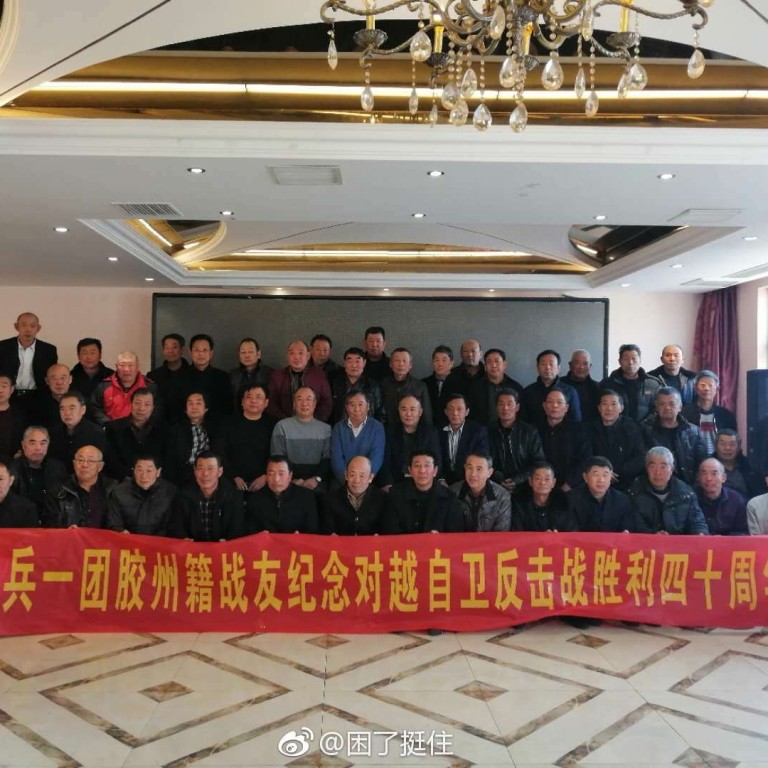
40 years after the Sino-Vietnam border war, Chinese veterans defy official silence to mark the date
- Groups of retired military personnel gather in private around China despite Beijing’s reluctance to mark the politically sensitive anniversary
- Border disputes still simmer between the two countries, tensions that Beijing is wary of inflaming
In the eastern Chinese city of Qingdao on Sunday, 62-year-old Sun Xingan and hundreds of his comrades met to remember those who died.
The People’s Liberation Army veterans were one of several groups of former military personnel who gathered on the weekend to mark the 40th anniversary of the China-Vietnam border war, a conflict that remains politically sensitive today.
They met in private because while the anniversary was commemorated publicly in Vietnam, the authorities in China remained silent, wary of inflaming ongoing tensions with neighbours over sovereignty.
“The authorities so far still reluctant to organise any anniversary events [for the war], but veterans across the country insisted on holding gatherings on Sunday because we still believe the war is still a badge of honour,” Sun said.
“In Qingdao, more than 300 veterans took part in a gathering to commemorate the war and mourn our comrades killed in the conflict.”
On February 17, 1979, around 300,000 Chinese troops entered Vietnam in response to the country’s invasion of Cambodia.
PLA soldiers clashed with a far smaller force in the tens of thousands, though accounts vary. The conflict lasted for four weeks, with a few skirmishes that followed, and claimed the lives of an estimated 7,000 Chinese forces, and perhaps tens of thousands of Vietnamese.
Border war with Vietnam a lingering wound for China’s forgotten soldiers
The anniversary is sensitive for both parties but in Vietnam, Nhan Dan, the Communist Party’s official newspaper, ran several articles over the weekend about the commemorations.
In China, there was no mention of the moment in state outlets Xinhua and People’s Daily but videos of small gatherings circulated online, including one of a small band of veterans playing the patriotic song Bloodstained Glory in the southern city of Shunde on Sunday.
However, arranging such reunions gets more difficult as time passes.
Chen Zaichun, a 62-year-old veteran from Chengdu in Sichuan province, said veterans there did not get together this time because they had lost contact with one another.
“It’s very difficult to keep in touch with each other year after year, with some of our comrades passing away… We are all getting old,” Chen said.
Time is also running out for Lou Yuming, from Nanning in Guangxi, which borders Vietnam. He said his health was declining, his memory was fading and he hoped the authorities would acknowledge the contribution of the veterans soon.
“There are several bullet fragments in my brain from the war and doctors refuse to take them out because all the pieces pierce my cranial nerves,” Lou said. “I just hope the government will give us an official recognition as soon as possible.”
Observers said China’s reluctance to publicly mark the anniversary related to its lingering border disputes today. Territorial disputes between the two countries have led to bloodshed on multiple occasions, as they did in the 1988 skirmish at Johnson South Reef in the South China Sea, where Chinese forces expelled the Vietnamese navy, killing more than 60 Vietnamese and wounding several others.
“[The anniversary] is a bit sensitive, and we can see that from the fact that China did not arrange a dedicated memorial activity to it. Chinese officials still begin from the perspective of maintaining the big picture of relations with Vietnam,” Zhang Jie, international relations researcher at the Chinese Academy of Social Sciences, said.
“This has to do with relations between big and small countries, with victory and defeat in war. China does not want to aggravate the emotions of Vietnam’s officials and its population.”
China’s military overhaul likely to raise neighbours’ concerns over improved offensive capabilities
Derek Grossman, from the US Rand Corporation think tank, said Beijing’s reticence on the anniversary had mixed results for China, and affected regional conversations with Asian neighbours about past and present conflicts.
“In the interest of transparency, [acknowledging the anniversary] should be the best option for China,” Grossman said.
“It is convenient for Vietnam to be more vocal about the anniversary ... But this is the last time China fought a war and lost. If they start to talk about it, it could open up a whole can of worms where others can say ‘well, you are actually bullying Vietnam and other counter claimants right now’. To bring it up would be bad news for Beijing.”
Collin Koh, a research fellow in maritime security at S. Rajaratnam School of International Studies in Singapore, said China’s losses at the hands of the Vietnamese were a sore point for the military.
“One likely reason why China would downplay this war is because PLA troops got a bloody nose at the hands of not even regular [Vietnamese People’s Army] troops, but border defence militia,” Koh said.
“Overall, the border war with Vietnam might have been touted by Beijing as a strategic victory in ‘teaching a lesson’ to Hanoi but clearly the military setbacks suffered despite its numerical and certain qualitative advantages over the Vietnamese could have been regarded as nothing short of embarrassing.”
But former Vietnamese ambassador Nguyen Ngoc Truong noted that no senior Vietnamese official made a statement about the anniversary.
He said this was the first time the Vietnamese media had been allowed to write about the anniversary so publicly, due in large part to public sentiment about the war.
“The Communist Party of Vietnam has been trying to shelve this war to maintain good relations with China. But the public opinion in Vietnam, especially among veterans of the 1979 war, won’t let them do so any more,” he said.


